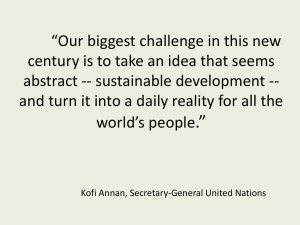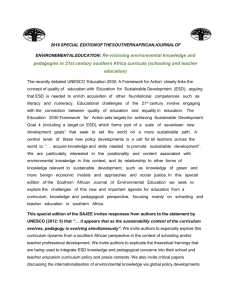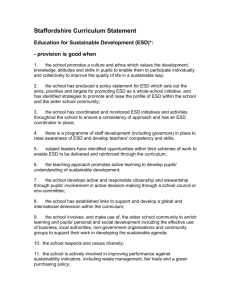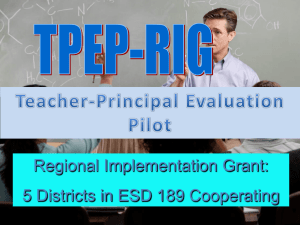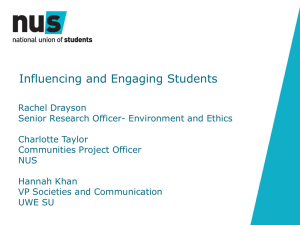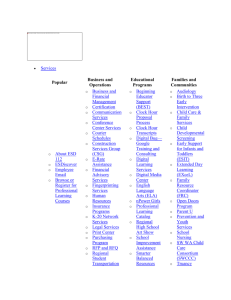Cure or Placebo? - International Institute for Sustainable Development
advertisement
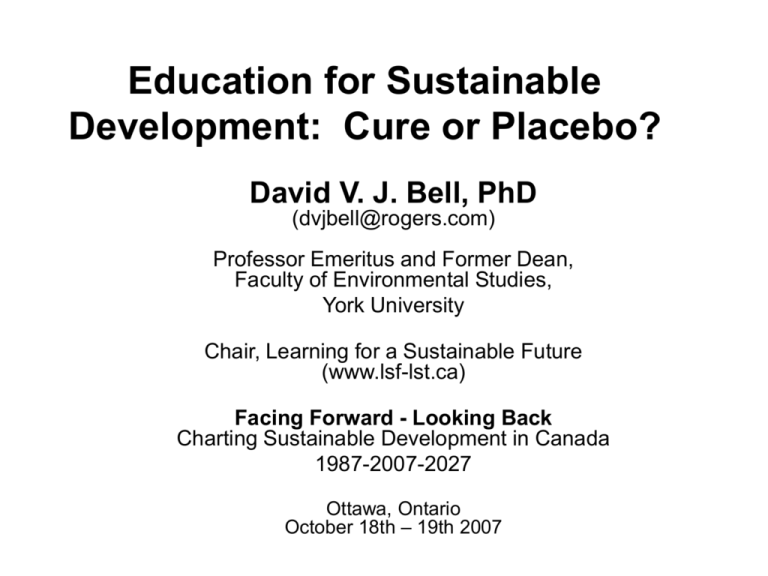
Education for Sustainable Development: Cure or Placebo? David V. J. Bell, PhD (dvjbell@rogers.com) Professor Emeritus and Former Dean, Faculty of Environmental Studies, York University Chair, Learning for a Sustainable Future (www.lsf-lst.ca) Facing Forward - Looking Back Charting Sustainable Development in Canada 1987-2007-2027 Ottawa, Ontario October 18th – 19th 2007 Outline Where Have We Been? – Our Common Future and Agenda 21 – ESD in Canada Where Are We Now? – UNDESD and UNECE – Canada’s Response Where Are We Going? – Cure or Placebo? – What we need to do over next 20 years Our Common Future • Strengthen basic education • Communicate effectively with people: “The changes in attitudes, in social values, and in aspirations the report urges will depend on vast campaigns of education, debate, and public participation.” • A new kind of education also needed: “Education should therefore provide comprehensive knowledge, encompassing and cutting across the social and natural sciences and the humanities, thus providing insights on the interaction between natural and human resources, between development and environment.” Agenda 21 • • • Education mentioned in every chapter Ch 36 “Promoting Education [formal], Public Awareness [informal] and Training [nonformal]” 4 thrusts: – – – – improve basic education (especially in the developing countries) reorient existing education to address SD (strengths approach) develop public understanding and awareness provide training for all sectors of society including business, industry and government. Other ESD Milestones • ECO-ED (Toronto, October 1992) – Nearly 6000 delegates, 500+ Aboriginal reps – Each panel had gov’t/ed, business, aboriginal, youth, gender balance • International Conference on Environment and Society: Education and Public Awareness for Sustainability (1997 – Thessaloniki, Greece) • UN CSD reviews Ch. 36 of Agenda 21(1998) • WSSD (2002) • UNDESD (2005 – 2014) – UN University Institute of Advanced Studies [UNU-IAS] initiatives (including Regional Centres of Expertise [RCE’s] on ESD) ESD in Canada • Brundtland hearings led to NTFEE • NTFEE recommends round tables • NRTEE establishes LSF in 1991 – Jack McLeod (former CEO of Shell) Chair – Jean Perras Executive Director • UNESCO/UNITWIN Chair in “Reorienting Teacher Education Toward Sustainability” established at York University in 1999 – Chuck Hopkins appointed • EC “Framework for Environmental Learning and Sustainability Education in Canada” (for WSSD) Learning for a Sustainable Future (LSF) • A national, bi-lingual, non-profit organization founded in 1991 • Required to self-fund • Promotes, through education, the knowledge, skills, perspectives and practices essential to a sustainable future • Partners with business, community, educators, students, and governments across Canada to encourage sustainability action projects Outline Where Have We Been? – Our Common Future and Agenda 21 – ESD in Canada Where Are We Now? – UNDESD and UNECE – Canada’s Response Where Are We Going? – Cure or Placebo? – What we need to do over next 20 years The UN Decade of Education for Sustainable Development (UNDESD): 2005 to 2014 • March 2005 - UN Economic Commission for Europe (UNECE) High-level meeting of Environment and Education Ministries adopted: – ESD Strategy – Vilnius Framework for its implementation • The Canadian delegation: – – – – Gerald Farthing CMEC (formal) Diane Rochon, Ministère de l’Éducation Québec Suzan Bowser, EC (non-formal) David Walden, Canadian Commission for UNESCO (informal) UNECE Strategy Goal: to develop and incorporate ESD into the formal, non-formal and informal education systems. Objectives: • ensuring policy, regulations & operations support ESD; • promoting ESD though formal, non-formal & informal learning; • equipping educators with the competence to include SD in their teaching; • ensuring that ESD tools & materials are accessible; • promoting research & development of ESD; and • strengthening cooperation on ESD at all levels; • fostering conservation, use, and promotion of knowledge of Indigenous Peoples in ESD. Partnering to Respond to UNDESD • Environment Canada • Manitoba Education, Citizenship and Youth (MECY)/Manitoba Advanced Education and Literacy (MAEL) • Learning for a Sustainable Future ESD Strategic Initiatives • Provincial/Territorial ESD Working Groups • National ESD Expert Council • Canadian Sustainability Curriculum Review Initiative • ESD Resource Database • Youth Taking Action Forums • Sustainability Model School Project • Sustainability Education Academy Outline Where Have We Been? – Our Common Future and Agenda 21 – ESD in Canada Where Are We Now? – UNDESD and UNECE – Canada’s Response Where Are We Going? – Cure or Placebo? – What we need to do over next 20 years Education: Cure or Placebo? • What’s the disease? (“You’ve got humans!”) • Is it really that bad? • Does education really help? Or does it buy time for more Business As Usual? Some Ancient Chinese Wisdom If you are thinking a year ahead, sow seed, If you are thinking ten years ahead, plant a tree. If you are thinking one hundred years ahead, educate the people. Kuan Tzu Chinese Poet, c. 500 B.C. Looking Back 100 Years • population (about 2 billion) • global governance (few countries, many empires, national economies) • technologies (automobile and telephone just beginning to have an impact) • miniscule “civil society sector” • environmental awareness • • • • no concept of global climate change little understanding of pollution or its impacts on health few concerns about biodiversity, deforestation no one imagined seeing planet earth from space Looking Ahead 100 years – How will we: • Meet basic needs for food, water, shelter, and energy of 10 billion people? • Stabilize the climate by reducing GHG emissions globally by more than 60%? • Reduce proportion of the world’s population living on US$2 per day or less? ( currently nearly half -- 3 billion) • Achieve a low carbon “factor 10” economy? – shift from “take-make-waste” production cycle to “cradle-to-cradle”? (There’s no waste in Nature) • Achieve a more peaceful, “secure” world? What do we need to do? • • • • Do we need a culture shift? Is this sufficient or merely necessary? What would it entail? Where should we be in 20 years? What will this require? • ESD as basic, general education for the 21st century • Reorientation of all professional and technical post-secondary education • Improved non-formal ESD in all sectors (especially governments?) • Strengthened informal ESD including in advertising Funding for ESD • • • • Complicated by the division of powers Budget cuts, shifting priorities in EC Lack of an overall GoC approach Variable support from provinces and territories • Result: – Canadian government providing much less funding than many other UNECE countries – Some national initiatives funded by LSF! Is there any hope? • “A pessimist is an informed optimist.” – Russian proverb • “Hope is a verb with its sleeves rolled up.” – David Orr The Aboriginal Thanksgiving Address Finally, we acknowledge one another, female and male. We give greetings and thanks that we have this opportunity to spend some time together. We turn our minds to our ancestors and our Elders. You are the carriers of knowledge, of our history. We acknowledge the adults among us. You represent the bridge between the past and the future. We also acknowledge our youth and children. It is to you that we will pass on the responsibilities we now carry. Soon, you will take our place in facing the challenges of life. Soon, you will carry the burden of your people. Do not forget the ways of the past as you move toward the future. Remember that we are to walk softly on our sacred Mother, the Earth, for we walk on the faces of the unborn, those who have yet to rise and take up the challenges of existence. We must consider the effects our actions will have on their ability to live a good life. Appendix: Additional slides • UNECE Vision • Elements of Canada’s strategy STRATEGY FOR EDUCATION FOR SUSTAINABLE DEVELOPMENT Vision Our vision for the future is of a region that embraces common values of solidarity, equality and mutual respect between people, countries and generations. It is a region characterized by sustainable development, including economic vitality, justice, social cohesion, environmental protection and the sustainable management of natural resources, so as to meet the needs of the present generation without compromising the ability of future generations to meet their needs. Education, in addition to being a human right, is a prerequisite for achieving sustainable development and an essential tool for good governance, informed decision-making and the promotion of democracy. Therefore, education for sustainable development can help translate our vision into reality. Education for sustainable development develops and strengthens the capacity of individuals, groups, communities, organizations and countries to make judgements and choices in favour of sustainable development. It can promote a shift in people’s mindsets and in so doing enable them to make our world safer, healthier and more prosperous, thereby improving the quality of life. Education for Sustainable development can provide critical reflection and greater awareness and empowerment so that new visions and concepts can be explored and new methods and tools developed. National ESD Expert Council Mission: Promote a Canadian culture of sustainability by developing and strengthening collaboration and leadership in education and training. Goals: 1. Strengthen, promote & communicate ESD activities in Canada 2. Provide leadership & support innovation in ESD. 3. Identify & address gaps at a national level 4. Disseminate ESD research 5. Monitor & report on ESD progress 6. Funding of NESDEC and Provincial WGs. National ESD Expert Council Structure Provincial Working Group Territorial Working Group Sub-committees National Expert Council National Agencies Steering S Committee Secretariat Provincial Working Group Provincial Working Group International Agencies Provincial Working Group Provincial/Territorial ESD Working Groups Goal: To support and foster a culture of ESD in each jurisdiction Objectives: • Build ESD into the formal/non-formal and informal education culture • Establish strategic collaborations between governments, education sector leaders, business, and community NGO’s • Bring together stake-holders for policy input, debate, exchange, planning • a sense of urgency and the latest science on critical sustainability issues • Pilot Working Group established in Manitoba June 2005 • Groups now in B.C., Alberta Sask., Ont., N.B., N.S., and Nunavut Canadian Sustainability Curriculum Review Initiative Goal: To infuse ESD into School curriculum policy and instructional methods Objectives: • Identify fundamental concepts, skills, values, and instructional methods for the following themes: – Energy - Transportation – Climate Change - Citizenship & Community – Ecosystems - Human Health Environment – Water - Indigenous and Local Knowledge – Biodiversity - Food and Agriculture Youth Taking Action Forums Goal: To empower youth to take action on important sustainability issues in their schools and communities. Objectives: • Increase awareness and understanding of local sustainability issues • Empower youth by engaging them in community-based action projects that develop their leadership skills. • Increase the teaching of sustainability issues • Enhance the capacity of local NGO’s to deliver sustainability programs. • Share and celebrate success. Education for Sustainable Development Model School Project Vision: To inspire the effective integration of excellent ESD practices into Stouffville District Secondary School as a model of ESD for schools across Canada A commitment to sustainability is evident in: • School Culture: the school mission, improvement plan, extracurricular activities • School Operations: the way the school is run is sustainable • Physical Surroundings: the building and the surrounding area are consistent with the goals of sustainability • Curriculum: curricular expectations and instructional strategies facilitate ESD learning Sustainability Education Academy for Education Leaders • Goal: to motivate and equip senior education officials to lead the integration of ESD as a core value in all aspects of formal education including: policy, curriculum, teaching, learning, professional development, and the sustainable management of human, physical and financial resources. • Three day Seminar modeled after Sustainable Enterprise Academy • In partnership with LSF, Schulich School of Business, York U. Faculty of Education, and the UNESCO Chair in ESD. Resources for Rethinking: ESD Resource Database Goal: • To provide teachers with tools to facilitate the effective integration of ESD into formal school programs (K-12) across Canada Objectives: • Improve access to resources by providing teachers with a searchable ESD resource database, that links resources to all provincial/territorial curricula. • Provide quality resources by ensuring all resources are professionally reviewed by classroom teachers. • Enhance capacity of ESD publishers to produce quality resources for teachers.
